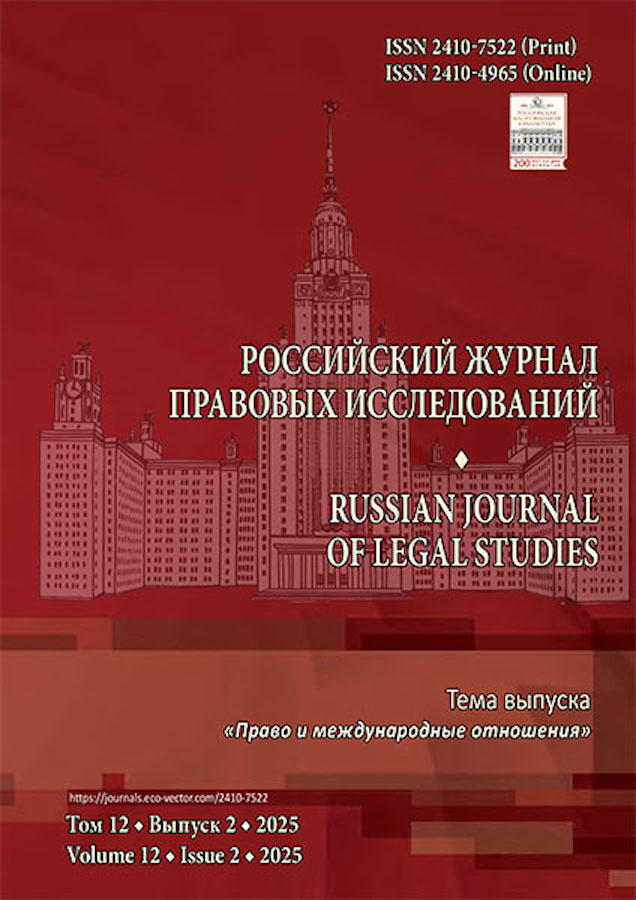Legal Regulation of Platform Relations: A Cybernetic Approach
- Authors: Loginov M.P.1,2, Usova N.V.1,2
-
Affiliations:
- Ural State University of Economics
- Ural Federal University named after the First President of Russia B.N. Yeltsin
- Issue: Vol 12, No 2 (2025)
- Pages: 69-80
- Section: Private law
- Submitted: 01.09.2024
- Accepted: 10.03.2025
- Published: 18.07.2025
- URL: https://journals.eco-vector.com/2410-7522/article/view/635565
- DOI: https://doi.org/10.17816/RJLS635565
- EDN: https://elibrary.ru/ACHTHV
- ID: 635565
Cite item
Abstract
The paper analyzes the theory and methods of the legal regulation of platform relations in the Russian law, which is determined by the characteristics, role, functions, and tasks of the branch of law, allowing the combined use of incentives and restrictions, direct and indirect enforcement methods. The contemporary economy has actually become a platform economy; digital platforms have become a public institution, they simplify and improve public and private legal relations. To analyze platform relations and develop their legal regulation techniques, we propose to use a cybernetic approach that studies legal management in complex dynamic systems to optimize and improve the management processes in solving specific legal problems. The paper is aimed to study existing doctrinal approaches to the definition, structure, and classification of legal frameworks with subsequent modeling of a legal framework for platform relations based on the cybernetic approach. The paper is structured based on its aim and includes sections on classification approaches to legal regulation; characteristics, essence, and purpose of legal frameworks; classification and structure of legal frameworks; concept and classification of platform relations; concept and characteristics of the legal regulation of platform relations; functions of the legal framework for platform relations. Based on the definitions of the legal regulation, digital platform, platform relations, and legal framework of platform relations developed by the authors, they propose a classification of platform relations based on their openness, type of mediation, features, functions, and characteristics of the proposed legal regulation of platform relations. In conclusion, the authors identified two modeling approaches to legal regulation of platform relations, including the approach providing for the general and special legal regulation and recommended for further research.
Full Text
About the authors
Mikhail P. Loginov
Ural State University of Economics; Ural Federal University named after the First President of Russia B.N. Yeltsin
Author for correspondence.
Email: port-all@mail.ru
ORCID iD: 0000-0003-0831-3004
Dr. Sci. (Economics), Assistant Professor
Russian Federation, Ekaterinburg; EkaterinburgNatalya V. Usova
Ural State University of Economics; Ural Federal University named after the First President of Russia B.N. Yeltsin
Email: nata-ekb-777@yandex.ru
ORCID iD: 0000-0002-7575-6078
Dr. Sci. (Economics), Assistant Professor
Russian Federation, Ekaterinburg; EkaterinburgReferences
- Beliaeva GS. Referring to the issue of the nature, contents and peculiarities of the regulatory-legal fixation of the private law regime. Actual Problems of Russian Law. 2014;(7):1321–1326. EDN: TFWVSJ
- Kartskhiia AA. Civil law model for regulating digital technologies [dissertation]. Moscow; 2019. (In Russ.) EDN: IRNCZH
- Belykh VS. Digital economy and digital business as objects of legal regulation. Business, management and law. 2023;(2):32–37. EDN: LOSENO
- Barzilova IS. Concept and legal nature of legal regimes. Vestnik of Moscow University of the Ministry of Internal Affairs of Russia. 2017;(3):10–14. EDN: YTOAOX
- Matuzov NI, Mal'ko AV. Legal regimes: questions of theory and practice. Proceedings of Higher Educational Institutions. Pravovedenie. 1996;(1):16–29. (In Russ). EDN: TPNNRH
- Shamsumova EF. Legal regimes: Theoretical aspect [dissertation]. Ekaterinburg; 2001. (In Russ.) EDN: NLXHGJ
- Beliaeva GS. Legal regime: general theoretical study [dissertation]. Kursk; 2013. (In Russ.)
- Beliaeva GS. To the question of delimitation of the legal regime and other related legal categories. Economic Consultant. 2013;(4):22–25. EDN: RSYAXH
- Beliaeva GS. Legal regimes based on advantages: towards the question of the concept. Administrative and municipal law. 2014;(10):1073–1080. doi: 10.7256/1999-2807.2014.10.12288 EDN: SXJEXR
- Alekseev SS. General permissions and general prohibitions in Soviet law. Moscow: Yuridicheskaya literatura; 1989. 286 p. (In Russ.)
- Morozova L.A. Constitutional regulation in the USSR. Moscow: Yuridicheskaya literatura; 1985. 144 p. (In Russ.)
- Blyakhman BYa. The legal regime in the system of regulation of social relations. Kemerovo: Kuzbassvuzizdat; 1999. 171 p. (In Russ.)
- Andrievskii KV. Financial and legal regimes. [dissertation]. Moscow; 2022. (In Russ.) EDN: WQGEOG
- Gorlenko VA. Legal regulation regime (theoretical and applied aspect) [dissertation]. Saint Peterburg; 2002. (In Russ.)
- Rodionov OS. The mechanism for establishing legal regimes by Russian legislation [dissertation]. Saratov; 2001. (In Russ.) EDN: CLNACQ
- Belyaev VP, Belyaeva GS, Dyadyun KV, et al. Modern theory of legal regimes: theoretical and sectoral approaches. Krasnoyarsk: Siberian Federal University; 2017. (In Russ.) EDN: YLAGFL
- Tsyganovkin VA. Systems of social regulation: the state and legal regimes. RSUH/RGGU Bulletin. Series Economics. Management. Law. 2011;(8):179–187. EDN: OBFHHF
- Alekseev SS. Theory of law. Moscow: BEK Publishing House; 1995. (In Russ.) EDN: RLSTNL
- Barbin VV. Features of legal regimes. Proceedings of the Management Academy of the Ministry of Interior of Russia. 2015;(3):20–22. EDN: UMOUYJ
- Malko AV. Incentives and restrictions in law. Proceedings of Higher Educational Institutions. Pravovedenie. 1998;(3):134–147. EDN: TMHBTB
- Bakhrakh DN. Administrative law. Moscow: Norma Publishing House; 2000. 640 p. (In Russ.) EDN: FZQZKG
- Mansurov GZ. On the imperfection of the conceptual apparatus of platform legislation. Bulletin of chelyabinsk state university. Series: law. 2022;(7):16–23. EDN: LBOYVW doi: 10.47475/2618-8236-2022-17203
Supplementary files








